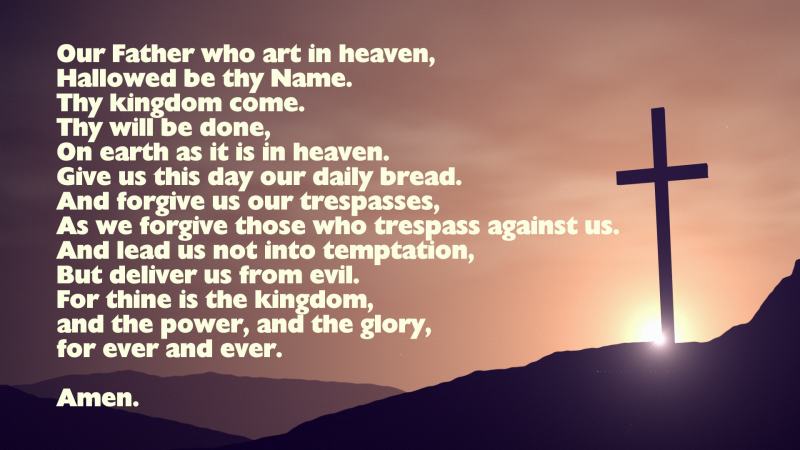"Forgive Us Our Trespasses"
Commentary on the Lord's Prayer
"Forgive us our trespasses" is the fifth of the seven petitions in the Lord's prayer (the first three address God, the second four are prayers related to our needs and concerns).
The Greek word for “forgive” in the New Testament is the word “aphes”, which also means to dismiss or free. So God’s forgiveness is not just about being pardoned from doing something wrong, but also about being released and freed from it. It is a truly life changing experience.
Notice that Jesus connects the notions of us seeking God’s forgiveness and forgiving others. They are inextricably linked. If we have experienced God’s pardon and acquittal, then we will surely forgive those who have wronged us. Christ underlines the importance of this immediately after the prayer. “For if you forgive other people when they sin against you, your heavenly Father will also forgive you. But if you do not forgive others their sins, your Father will not forgive your sins.” (recorded in Matthew 6:14-15) He also develops this further in the parable of the unmerciful servant, where we are taught to keep on forgiving those who have wronged us (Matthew 18:21-35).
A Prayer for Forgiveness
A beautiful short prayer which asks God for the forgiveness of sins and celebrates His wonderous gift of salvation:-
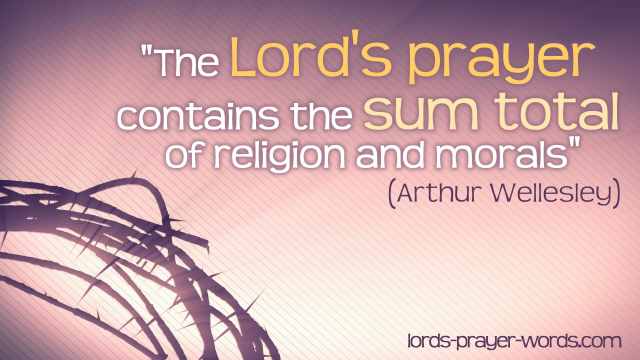
resources on this page
Adam Clarke's on "Forgive Us Our Trespasses"
Albert Barnes on "Forgive Us Our Trespasses"
(Commentary on Matthew chapter 6, verse 12)
read more commentaries and studies on the Lord's Prayer in our In-Depth Commentary Section
Adam Clarke
on "Forgive us our trespasses"
Verse 12. And forgive us our debts] Sin is represented here under the notion of a debt, and as our sins are many, they are called here debts. God made man that he might live to his glory, and gave him a law to walk by; and if, when he does any thing that tends not to glorify God, he contracts a debt with Divine Justice, how much more is he debtor when he breaks the law by actual transgression! It has been justly observed, "All the attributes of God are reasons of obedience to man; those attributes are infinite; every sin is an act of ingratitude or rebellion against all these attributes; therefore sin is infinitely sinful."
Forgive us.-Man has nothing to pay: if his debts are not forgiven, they must stand charged against him for ever, as he is absolutely insolvent. Forgiveness, therefore, must come from the free mercy of God in Christ: and how strange is it we cannot have the old debt cancelled, without (by that very means) contracting a new one, as great as the old! but the credit is transferred from Justice to Mercy. While sinners we are in debt to infinite Justice; when pardoned, in debt to endless Mercy: and as a continuance in a state of grace necessarily implies a continual communication of mercy, so the debt goes on increasing ad infinitum. Strange economy in the Divine procedure, which by rendering a man an infinite debtor, keeps him eternally dependent on his Creator! How good is God! And what does this state of dependence imply? A union with, and participation of, the fountain of eternal goodness and felicity!
As we forgive our debtors.] It was a maxim among the ancient Jews, that no man should lie down in his bed, without forgiving those who had offended him. That man condemns himself to suffer eternal punishment, who makes use of this prayer with revenge and hatred in his heart. He who will not attend to a condition so advantageous to himself (remitting a hundred pence to his debtor, that his own creditor may remit him 10,000 talents) is a madman, who, to oblige his neighbour to suffer an hour, is himself determined to suffer everlastingly! This condition of forgiving our neighbour, though it cannot possibly merit any thing, yet it is that condition without which God will pardon no man. See Mt 6:14, 15.
Source: Adam Clarke's Commentary on the Bible
Matthew Henry on "Forgive Us Our Trespassesd"
5. And forgive us our debts, as we forgive our debtors, This is connected with the former; and forgive, intimating, that unless our sins be pardoned, we can have no comfort in life, or the supports of it. Our daily bread does but feed us as lambs for the slaughter, if our sins be not pardoned. It intimates, likewise, that we must pray for daily pardon, as duly as we pray for daily bread. He that is washed, needeth to wash his feet. Here we have,
(1.) A petition; Father in heaven forgive us our debts, our debts to thee. Note, [1.] Our sins are our debts; there is a debt of duty, which, as creatures, we owe to our Creator; we do not pray to be discharged from that, but upon the non-payment of that there arises a debt of punishment; in default of obedience to the will of God, we become obnoxious to the wrath of God; and for not observing the precept of the law, we stand obliged to the penalty. A debtor is liable to process, so are we; a malefactor is a debtor to the law, so are we. [2.] Our hearts' desire and prayer to our heavenly Father every day should be, that he would forgive us our debts; that the obligation to punishment may be cancelled and vacated, that we may not come into condemnation; that we may be discharged, and have the comfort of it. In suing out the pardon of our sins, the great plea we have to rely upon is the satisfaction that was made to the justice of God for the sin of man, by the dying of the Lord Jesus our Surety, or rather Bail to the action, that undertook our discharge.
(2.) An argument to enforce this petition; as we forgive our debtors. This is not a plea of merit, but a plea of grace. Note, Those that come to God for the forgiveness of their sins against him, must make conscience of forgiving those who have offended them, else they curse themselves when they say the Lord's prayer. Our duty is to forgive our debtors; as to debts of money, we must not be rigorous and severe in exacting them from those that cannot pay them without ruining themselves and their families; but this means debt of injury; our debtors are those that trespass against us, that smite us (Mt 5:39,40), and in strictness of law, might be prosecuted for it; we must forbear, and forgive, and forget the affronts put upon us, and the wrongs done us; and this is a moral qualification for pardon and peace; it encourages to hope, that God will forgive us; for if there be in us this gracious disposition, it is wrought of God, and therefore is a perfection eminently and transcendently in himself; it will be an evidence to us that he has forgiven us, having wrought in us the condition of forgiveness.
Source: Matthew Henry's Commentary on the Whole Bible Volume V (Matthew to John)
Next: "Lead Us Not Into Temptation"
Verse 12. And forgive us our debts, etc. The word debts is here used figuratively. It does not mean literally that we are debtors to God, but that our sins have a resemblance to debts. Debtors are those who are bound to others for some claim in commercial transactions; for something which we have had, and for which we are bound to pay according to contract. Literally, there can be no such transaction between God and us. It must be used figuratively. We have not met the claims of law; we have violated its obligations; we are exposed to its penalty; we are guilty; and God only can forgive, in the same way, as none but a creditor can forgive a debtor. Debts here, therefore, mean sins, or offences against God-- offences which none but God can forgive. The measure by which we may expect forgiveness is that which we use in reference to others. See Ps 18:25,26, Mt 18:28-35, Mk 11:25, Lk 11:4. This is the invariable rule by which God dispenses pardon. He that comes before him unwilling to forgive, harbouring dark and revengeful thoughts, how can he expect that God will show him that mercy which he is unwilling to show to others? It is not, however, required that we should forgive debts in a pecuniary sense. To them we have a right, though they should not be pushed with an overbearing and oppressive spirit; not so as to sacrifice the feelings of mercy, in order to secure the claims of right. No man has a right to oppress; and when a debt cannot be paid, or when it would greatly distress a wife and children, a widow and an orphan, or when calamity has put it out of the power of an honest man to pay the debt, the spirit of Christianity requires that it should be forgiven. To such cases this petition in the Lord's prayer doubtless extends. But it was probably intended to refer principally to injuries of character or person, which we have received from others. If we cannot from the heart forgive them, we have the assurance that God will never forgive us.
(z) "forgive us our debts" Mt 18:21-35, Lk 7:40-48
Source: Barnes' New Testament Notes
about the commentary writers
In this section you can discover more about the Lord's Prayer through some of the most notable exponents in biblical interpretation. 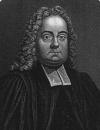 • Matthew Henry (1662-1714) was a non-conformist English clerygman. His commentaries on the scriptures are intended as a devotional guide to the Bible, rather than as a critical study.
• Matthew Henry (1662-1714) was a non-conformist English clerygman. His commentaries on the scriptures are intended as a devotional guide to the Bible, rather than as a critical study.
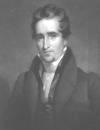 • Albert Barnes (1798-1870) was a Presbyterian minister and American theologian. His 'New Testament Notes' are invaluable in helping to understand difficult passages of scripture. Barnes frequently references the original Greek to reveal the meaning of the text.
• Albert Barnes (1798-1870) was a Presbyterian minister and American theologian. His 'New Testament Notes' are invaluable in helping to understand difficult passages of scripture. Barnes frequently references the original Greek to reveal the meaning of the text.
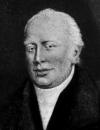 • Adam Clarke (1769 or 62 to 1832) was a Methodist minister and biblical theologian. His extensive commentary on the New Testament, at around 6000 pages long, is one of the longest works on the bible ever written by one person.
• Adam Clarke (1769 or 62 to 1832) was a Methodist minister and biblical theologian. His extensive commentary on the New Testament, at around 6000 pages long, is one of the longest works on the bible ever written by one person.


